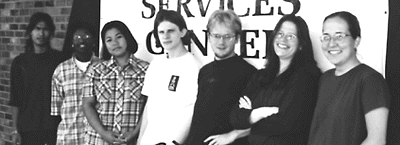![[Around Tappan Square]](bandstand_fin.gif)
![[Around Tappan Square]](bandstand_fin.gif)

Several Oberlin College juniors and seniors served as math tutors for this year's program. Among them were, from left: Hoa Tran, Chanel Chambers, Marilou Marcelo, Stefan Betz Bloom, Jeff Kerr, Patricia Hehir, and Pam Parsa
In order to earn a high-school diploma, Ohio students must pass a proficiency test that covers reading, writing, science, citizenship, and math up to the eighth-grade level.
Yet more than half the students who entered Oberlin High School (OHS) this year have failed the math portion.
"Math is the big-gest stumbling block throughout the state," says Lynn Swanson, OHS dean of students.
Fortunately, Oberlin youth have somewhere to go for help -- the Math Proficiency Intervention Program.
Offered each summer since 1992 by the Oberlin Community Services Council (OCSC), the three-week-long program draws tutors from both town and gown to help OHS students prepare for the test. "The math program is a natural extension of our mission," says OCSC executive director Ann Fuller. The 42-year-old community agency provides services to people who need help meeting basic needs. "Academic skills are basic needs," says Fuller.
With funding from OCSC, Oberlin College's work-study and Bonner Scholars programs, the Ohio Department of Education, Christ Episcopal Church, and the United Way, the sessions are offered free to any student who has failed the math section at least once. This year 21 tutors--town residents, OCSC staff, and Oberlin College students--and 37 OHS tutees took part in the program. Ironically, none of the Oberlin students were math majors.
College senior Yvonne Doble saw in the program an opportunity to apply her academic skills to a real situation. "I'm really strongly interested in education and I wanted the opportunity to connect and interact with students in the area," she says. "I think it's one of the best things I did this summer."
Veteran medical-school professors Hugh and Lois Pake McCorkle, both '47, have spent three summers as tutors. Many tutees are somewhat frightened by math, says Lois. One of her goals was to help them overcome their fear. "We'd like to see them get though this without much trauma," she says.
Besides focusing on math skills, tutors worked on improving test-taking skills and self-confidence, encouraging their charges to keep a positive attitude and to manage stress. OHS sophomore Antonio Stanford says his tutor helped him learn not to rush through the problems. Doing so helped him realize, he says, that "math is not as hard as I thought it was."
Tutees' success rates have been rising steadily--42 percent of those enrolled in this year's program passed, up from 31 percent last year. Students who did not pass may retake the test, as well re-enroll in the tutoring program. And even though some do have to take the test more than once, tutors and tutees emphasize that practice and perseverance are important. "Improve-ment is the overall goal," says College junior Jeff Green.
--CHANEL CHAMBERS '98
Back to Around Tappan Square
Return to the OAM Fall 1997 Table of Contents